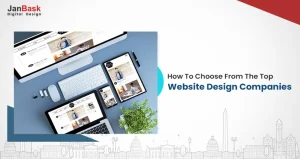
If you have no experience establishing or hosting a website, you may believe your only option is to hire a professional with the requisite expertise to do it for you. However, you don't need any coding skills or a fancy degree to develop a website nowadays. And we can thank website designers and website builders for that.
But which is the better option for getting a website: a website builder or a web designer? Let's compare the best methods for getting a website.
Should you develop your own website or employ a web designer? Both have advantages and disadvantages. We'll look at the distinctions between the two so you can decide which one is best for you.

Looking for Web Design Services?
Before deciding whether a website builder or web designer is best for you, you should assess your needs and be clear about what you want your website to achieve for you. Consider all of the different pages and features you may require.
Do you want customers to buy something from you? Then, in that case, you would require an online shop system. Do you wish to regularly contribute content? Then you'll need blogging capabilities. Do you want people to fill out a form or set up an account? Or are they simply looking for information on your website?
Another crucial subject to consider is whether you are OK with a more generic-looking website or whether you prefer something more original and custom-built.
Depending on your functionality requirements, you'll be able to determine how to get your website up and running and who you would need to collaborate with. What website designing tools you’ll require? This will also have an impact on the cost and length of time required to develop your website. You can evaluate your alternatives for website setup once you have a strong concept of what you need and what you intend your website to do.
So, what are the different ways of developing a website?
The two most common strategies businesses follow are to employ a template-based website builder or collaborate directly with a web designer and a developer to create a custom website. This can be done by hiring a freelance designer and developr or collaborating with a web design firm or agency. The third alternative is to create a hybrid solution by combining a website builder and a web designer.
Let’s understand each of these options:
A website builder is a do-it-yourself tool that enables users to create websites using pre-written templates without having to design or code them from scratch. There are many alternate design templates available from website builders. Find a builder that meets your demands which is not at all tough because they provide a wide range of possibilities. From there, you can edit the template by adding widgets and design components to your website. You also need to have a strong web strategy.
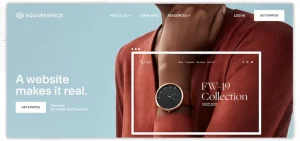
There are several website builders available, and the competition is strong. Let's look at the most popular options available in the market:
These are just a few of the several website builders available to you. Each one has a unique specialty and selection of templates.
Both online and offline platforms are available for website builders. The difference between the two is very simple. An offline website builder is a program that enables you to create your website using a platform downloaded on your computer (instead of doing everything through your browser). Once the critical design elements of an e-commerce website design are created, you can publish the finished project online by uploading files from your computer to a web server.
Platforms that function online are called online website builders (Wix, WordPress, and Squarespace are the big players). You may create your website entirely online using these online platforms, all you need is a browser and an internet connection.
Few website builders also offer solutions for those businesses who want to customize their website according to their own style guidelines beyond what their template permits. That's what called a hybrid solution.

A standard website builder offers a user interface that looks like a dashboard that you use to design, write website content and edit the web pages for your website. The following are this interface's most crucial elements:
Preview panel: To help you see the impact of your changes and how your website will seem as you make them, this panel includes a live preview of your website. You might or might not be able to physically drag components into other positions using your mouse with this panel's drag-and-drop feature.
Styling options: The majority of the variables that impact the style of the webpage you're editing should be displayed in one or more panels. The settings for changing colours, typefaces, and other design options are frequently found in these panels, which are typically located at the sides, bottom, or top of the dashboard.
Admin and the back end: The majority of website builders also offer the ability to add new pages and blog entries, administer an online store, install new features, and more. If necessary, it might also offer account management tools. Typically, you can switch between the builder/customizer and these invisible options whenever you want.
Given below is an example of Weebly's builder where the preview and drag and drop panel is in the middle, style options are to the left, and the back-end and admin settings at the top:
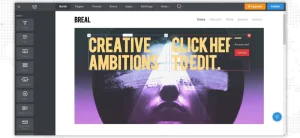
There are several distinct kinds of website builders. For instance, there are offline builders that you download and install on your computer and online builders that you access through your browser once you've established an internet connection. They may also be proprietary, requiring you to pay for the software or a subscription in order to use it, or they may be open-source, custom CMS, and available to everyone. There are several reasons to choose custom CMS.
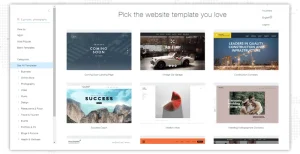
While Site123 and Wix are all proprietary site builders, WordPress.org is an example of an open-source platform. Wix is well recognized for its hundreds of lovely templates, whereas Site123 is well renowned for its simplicity of use and capacity to assist you in building your website in three easy stages.
A web designer is a graphic artist that has the ability to create your website from scratch. A web designer creates your website from scratch, and a website builder works within the parameters of set templates that are offered.
You can hire a freelance web designer who can work with you to design your website or you might employ a web design firm or agency with a large staff of web designers, developers, and marketers that can handle every aspect of your project for you, from the conception to the finished website like JanBask Digital Design.
Types of Web Designers
1. User Experience (UX)
2. User Interface (UI)
3. Visual
Let's explore these responsibilities in more detail so you can choose the web design services & specialization that's best for you.
UX designers
UX designers work to make sure that the website user experience design is organized in a way that engages users and provides a satisfying user experience. Their responsibility is to come up with data-driven, human-centric designs. This calls for extensive testing and research to collect and analyze data that will be utilized to guide their final design decisions.
UI designers
User interface designers also play an important role in website design. They prioritize interactions in addition to the experience it offers. More specifically, their job is to improve a website's usability and optimize it so that it can help promote conversions and guide towards the usability of icons in UI design.
Visual designers
As the name implies, visual designers deal with a website's visual components and layout. In this, elements of both UI and UX design are combined. A visual designer's responsibilities center on making the interface both aesthetically pleasing and simple to use.
The majority of web designers work with a limited number of tools, applications, and programs. The most significant of these are design and editing tools and software, for example, Adobe Photoshop, Adobe Illustrator, Corel Draw etc.
They could make use of tools for photo compression and optimization for stock photos. Additionally, a Content Management System (CMS) like WordPress and a platform for building websites like Elementor are frequently used by web designers:
Tools for wireframes in web design and prototypes are also helpful. They allow web designers to plan and generate models and mockups for the site's structure to be tested as the project is being developed.
A person with the knowledge to build a website from scratch level is a website developer. This typically means that they have knowledge pertaining to web coding languages like HTML, JavaScript, CSS gird layout for web design, and possibly others. Most website developers have formal education, training, or even a degree in website development, though this isn't always the case.
Website designers typically work as an employee of a company where they create and manage all types of websites for example, business websites, blog websites, non-profit websites, and eCommerce website development and maintenance of their company's website, or they work as a freelancer and offer their services to their client as per their demand.
While website developers traditionally use coding languages to design and edit websites, you can now discover developers that have very little experience with coding but are experts in using specific website builders. These developers can still design websites far more swiftly and easily than regular users since they are so skilled at using a certain builder. If the platform permits it, many website developers are also hired to use code to customize websites made using a website builder.
The difference between a website builder and a website developer is abundantly evident now. The first is a software program that helps in the creation of websites, whereas the second is a person who develops websites using either a coding language or other software tools. The misconception is most likely caused by the fact that, while utilizing a website builder, the user is technically the "builder."
Types of Web Developers
Web developers typically emphasize just a handful of programming languages. However, the languages they use vary depending on the web development work they undertook.
Three main categories of web developers are:
1. Front-end
2. Back-end
3. Full-stack
Front-end developers
Front-end developers create custom code employing languages using CSS, HTML, JavaScript, and other languages, as well as Content Management Systems (CMS) such as WordPress, Shopify, Magento etc. Front-end development, also referred to as client-side development, entails coding and programming the user-visible graphic components of a website. As a result, there is a great deal of overlap and collaboration between front-end developers and web designers. Learn more about what is CMS? And why websites need it.
Back-end developers
Back-end developers code databases and servers using advanced programming languages like PHP, C#, Java, Ruby, and SQL, as well as NodeJS and other server-side frameworks. Back-end development, also referred to as server-side development, mostly refers to website features that take place "behind the scenes" and are invisible to front-end users.
Full-stack developers
Lastly, full-stack developers write code for a website's front and back ends. They are quite aware with how these components operate separately as well as together. Full-stack developers set up and configure servers, code Application Programming Interfaces (APIs), query databases, and more in addition to creating web pages using CSS, HTML, and JavaScript.
Make sure not to mix up web designers and web developers. A designer is in charge of aesthetics—how your site will look—while a developer is in charge of turning your web design into a usable platform. Your website needs to be constructed after being designed by web designers. The solution lies with web developers. They build websites; they are tech wizards who are capable of converting a web design into a functional, real-world website.
So, What Does That Mean for Those Who Want to Create a Website?
As you might have anticipated, the decision of whether to use a website builder or employ a developer to create your website can have a massive impact on the whole process. Although some of the tradeoffs may seem quite evident, there are several widely held misconceptions that lead to individuals continuing to make the wrong choice:
Cost and Hosting
The cost of hiring a website designer and developer depends on a number of factors, for example, the size and features of the website but these are just one of many variables. The initial cost could range from a few hundred dollars to several thousand dollars, plus additional money for regular maintenance. While advanced e-commerce builders' corporate subscriptions might cost up to $250 per month, website builders typically cost up to $25 per month.
A website is meaningless unless it can be hosted live so that users of the internet can access it. Whether you build your website yourself or hire a developer, hosting a website is typically not free. The majority of website builders with integrated hosting provide a free plan, although they frequently have strict limitations. For instance, the builder's branding would presumably be prominent on your website. Additionally, even if you hired a developer, you would still need to find a hosting service to host your website.
Time and Maintenance
Here is where a common misunderstanding regarding the distinction between builders and developers arises. A developer will need a lot of time (often two to six weeks) to completely build your website. On the other hand, you can set up and host a simple website using various website builders in as less than 30 minutes. However, you'll need to invest a lot more of your own time in it if you intend to design, develop, and administer the website yourself. Therefore, you should decide if you want a quick and running website in a day or a website that is custom-made and administered, and maintained by your designer or agency.
Web technologies and the internet are constantly evolving. A custom website built using code will require practically continuous maintenance and manual improvements. This implies that even when your website is complete, you might still have to pay a developer for assistance. However, if you utilize a modern website builder, maintenance is typically as simple as quickly upgrading a plugin. And if you designed your own website or even had someone else like website maintenance services to do it for you, you can easily take care of this yourself.
Should everyone hire a professional and competent web designer? Actually, no. In reality, it's the wrong choice for many. If your company fits into one of these categories, choosing a website builder is generally a good idea:
Hobby
You don't need to work with a professional designer if you're a hobbyist looking to share your interest with others.
Blogger
There is no need to hire a professional web designer for your site at first until your blog is established and has a sizable readership. You can always change your design at a later time and import all of your prior entries.
New/ Unfunded startup businesses
Do you run a new business or bootstrapped startup? Most likely, you should just begin with a cheap website builder. You should just get your idea out there and see if there is any interest in it since you haven't yet proven the concept's validity. When your customer base is established and you are making money, you should probably consider upgrading your site with a professional design.
Solopreneur
If you're a solopreneur with a handful of clients, a cheap website builder is definitely perfect for you.
Unproven Concept
Have a fantastic new concept that you haven't yet tested? To gauge how well the concept is received, you should use a website builder. If it starts to generate revenue, you might want to hire an expert to rebuild your website.
Small Nonprofit
There is nothing wrong with using a website builder for small non-profit website design that have a lot of passion but little funding.
Selecting a website builder is a wise decision for several reasons. It's most likely the simplest, quickest, and least expensive approach to launch your website. Here are some of the top advantages and disadvantages of hiring a builder.
Cost
The affordability is the most obvious advantage of using a website builder, but there are other advantages as well. Website builders like Wix, Squarespace or wordpress offer you a sleek, contemporary, and ad-free website for a lot less money invested than hiring an agency or get a custom web design.
For instance, Squarespace's business plan is $26 per month (or less if you pay annually) and includes unlimited bandwidth and storage, a mobile-optimized site, website stats, a free custom domain, and 24/7 customer service. These figures are difficult to beat if you're a new company trying to establish yourself in your market and trying to make an impact.
Although the cost of hiring a good web designer can be quite pricey, you must keep in mind that they are building a website specifically for you from the beginning. You can get a detailed breakdown of the price variations between working with a designer and using a do-it-yourself builder and decide yourself on the route to be taken for your website.
The DIY factor
Using a website builder also allows you to complete the task quickly and on your own. You may create your own website using a website builder without needing to know how to code in any way, shape, or form. But setting everything up will still require some time and work. it may take a little trial and error effort to make your site look the way you want it. A lot of plugins are available that you can use to make your website look handy.
No design experience needed
A website builder can be used without any prior experience. Pre-designed templates make it possible to choose a beautiful template and build a visually appealing website without having any design experience. The drawback is that your website might resemble many others already online. There will be a limit to how much you can customise yourself, even though you can alter some aspects, like your logo, color theory, and photos, font sizes etc. 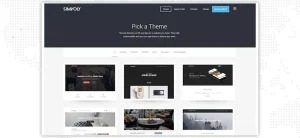
Built-in tech support
Website builders are professional platforms created to make things as simple as possible. There are supports available if you need it, and they guide you through any issues if there is any. You will be able to contact support by phone, email, or chat if there are any issues with your website.
Ease of use
Simple websites can be created by anyone using website builders. You won't need to be an expert to design your website because they will give you an intuitive interface, however, it might take some time to get used to how everything operates.
Any company that wants to stand out should be able to display a website that is just as amazing as the company itself. If you deliver an awful website, your competition will leave you far behind.
Working with a web designer entails dealing with a real person, not an AI tool. This means that in addition to a personal touch, you'll also benefit from a personal touch and careful attention to detail. This is an aspect that is overlooked by website builders and this is one of the important factors between a good and outstanding website. You must know what to expect from your amazing web designer. A designer should give your projects that extra "oomph" by assisting you in doing things that a website builder cannot. Let's look at the advantages of working with a skilled web designer.
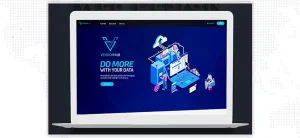
Create (and maintain) a consistent brand identity
The ideal approach to building a unique website is to hire a web designer and if you have the funding to do it then you should definitely go for a website designer. You can keep your brand identity constant by hiring branding services.
Consistent brand identity involves maintaining the consistency and flexibility of your brand by constantly reinforcing every aspect of your brand on your website, business cards, logo, and every other collateral. A web designer can build a site specifically for you and your brand instead of a web builder who will provide you with design templates that other companies can utilize.
Make you stand out from the competition
Every company, startup, or big corporates has its website. A website builder will provide you with a very attractive website, but it might at times look like a replica of other websites.
A web designer works with you to create a compelling website depending upon your target audience for you and your business.
No matter how you want your website to look, a seasoned web designer can make it happen.
Attention to detail
A designer also provides the finishing touches that make your website in sync with your vision, mission, and core values. Whether it’s a hand-drawn font, a specific arrangement of elements on your homepage, or custom-designed icons—a designer can make all sorts of unique adjustments to offer you the precise website of your dreams.
But bear in mind that if you hire a designer to make your website, you won't have an online presence overnight. A good designer can take from 2 to 6 weeks to make your website live. A good design takes time!
Collaboration
Once you've established a strong working relationship with a trustworthy designer, you can turn to him or her whenever you need future modifications.
Establishing a long-term business partnership with a designer ensures that an individual has a thorough understanding of your brand and is available to make necessary adjustments when your company develops or evolves.
Unlimited possibilities
There are restrictions to a website made via a builder. A designer will be able to go beyond these restrictions and offer you custom design alternatives if you're seeking a more extensive design solution to your website.
If you have a business that is hard to explain without the right design and graphics or you need a totally different and unique layout then perhaps a graphic design service will take care of you. Your designer informs you of the features that may actually be implemented given his understanding and come up with solutions for your particular requirements. But keep in mind that to make your web design a reality, you'll need a web developer (or a designer who is also a web developer).

The hybrid option can be the best choice if you need something in the middle. For the best of both worlds, it combines the advantages of web designers and web builders. Begin with a template, then work with a designer to modify it to meet your goals and brand.
With this choice, you may use the built-in advanced features of platforms like Squarespace, WordPress, or Shopify and save money. However, you'll still receive a custom layout design that's distinctive and in line with your brand by hiring a designer. This implies that additional hiring of a web designer and web developer may still be necessary. But the outcome will be far more original and consistent with your brand.
Let's examine the advantages and disadvantages of using a website builder now:
Advantages
The pricing is undoubtedly the greatest advantage. You can launch a website online for a relatively minimal expenditure.
Using a website builder, you may have your new site online in less than a day. It will normally take 4-6 weeks from start to launch if you hire a design company.
Many modern website builders provide templates and designs that appear good. The secret to making them function is to precisely duplicate the template design. Any modifications you make to the design will most likely be negative.
Disadvantages
A few website builder templates seem amazing, and few of them look good as well.
You also won’t have the benefit of someone who appreciates digital marketing for small business and visitor conversions to help optimize the conversion design of your website.
There are many people using the same themes and styles because so many people have recently jumped on the "free" website builder bandwagon. The majority of website builder templates are starting to share a similar appearance, giving them a basic and uninspired vibe.
There's something about the appearance of a website using a template that gives it a template-like vibe. The majority of people can also recognise a template, which is not ideal if you're utilising one, especially the free one.
The majority of website builders perform terribly when it comes to SEO. When it comes to optimising your website for Google search traffic, they don't provide particularly comprehensive tools. Additionally, a professional firm such as SEMRush or Ahrefs may be quite helpful for conducting accurate keyword research and optimising websites. Consequently, in this contest between a web designer and a website builder, the designer prevails.
When weighing the costs of employing a "free" website builder, the opportunity cost of missing potential sales must be taken into account.
Although these website builders' backend user interfaces are supposed to be simple to use, they usually aren't. Working inside a rigid framework while attempting to realise your vision for the website might be frustrating.
Still unsure about whether you ought to work with a qualified website designer? Here are some advantages and disadvantages of choosing that path:
Advantages
You are engaging an expert when you hire a website designer. Someone who can align and comprehend harmony, balance, and best practices for typefaces and colors in the design. They also understand how design affects visitor flow and how the user interface and information architecture work together. When you employ an expert, you shouldn't worry much and focus more on your business.
All websites look the same when you use the same builder theme. And especially when you use the free version templates. Hiring a website designer helps you get a sleek, contemporary look based on your style guidelines.
Maximum templates are not designed to increase visitor conversions. SEO services for small business can create a conversion path because it is targeted to a broad number of users and not tailored to an individual or specific user. A seasoned web designer organizes the design so that it is optimized for conversions, which means more leads and more sales.
A good website designer knows how to conduct keyword research, choose the best keywords to rank for, and ensure that your site is set and SEO-optimised for those keywords and provides users with an enjoyable and user-friendly experience. Most website builder platforms have minimal SEO tools and balance SEO user experience.
Have you ever discussed the need to change your DNS with tech support during a live chat session? Do you even have any idea what a DNS stands for and what the heck it is? When you hire a professional, those issues are resolved, and you get to pick up the phone and speak to a real person who can address them without making you feel stupid for not understanding technical terms.
Do you value your time at all? Paying a professional to provide results rather than wasting numerous hours slamming your head against a wall or teaching yourself a new talent that has nothing to do with your line of work, it is better to save many hours of your professional time and employ a web designer.
Disadvantages
Paying the high upfront cost of a professional design agency or a freelance designer is the biggest demotivation. This can be an issue, especially if you're a bootstrapped company.
A custom-designed website takes time to go live unlike using builders. It roughly takes six weeks to create a professionally designed website as the development process alone might take up to two weeks. You get the immediate thrill of having a website right away using a website builder.
You might shell out thousands of dollars to a web designer and not be happy with the results. It occurs. You probably won't enjoy what the web designer does for you if you don't appreciate their portfolio.
The web design industry resembles the Wild West in several ways. It is rather easy to put up a shingle and call yourself a website designer. As a result, there is a wide range in quality when picking a designer. A design firm should be evaluated based on two factors: reviews and portfolios. Keep looking if neither of those are satisfactory.
What is the price of a website? That is a valid query. You will receive five completely different quotes if you speak with five different design agencies. Knowing what a fair pricing is when hiring a web designer can be very difficult.
Stay cautious while choosing a design firm. As soon as the website is launched, confirm that you are the sole owner. There are design firms that don't grant you ownership rights to your website and bind you to an ongoing maintenance plan. Though it doesn't always happen, it's still important to be aware of.
Different circumstances may call for different ways of creating a website. For example, if you are a solopreneur or have a young business then hiring website design services or a freelancer web designer would cost you a little extra and maybe would be out of your budget. In this instance, using a builder is a quick and economical approach to creating a professional-looking website. You save money if you choose to use a builder, but make sure to pick one with themes that complement your brand.
Working with a designer is generally the best course of action if you have the budget or have been in business for some time and want to take your website to the next level.
Working with a web designer (freelance, via an agency, or through a web design firm) results in a unique website complementing your brand guidelines with the ability to create unique custom features.
If you want something in the middle, you may choose a hybrid approach and have a web designer create a website for you using a template.
Whatever you choose, always remember to consider the advantages and disadvantages of all your alternatives to discover the best one for you.
Interested in our Web Design & Development Services?

1.What Is the Difference Between a Web Developer vs Web Designer?
A web developer builds the website structure and operation using coding languages. The style and feel of the website are created by a web designer in the meantime. Typically, they work together on a web development project to build a useful website.
2. Can Web Developers Use Website Builders?
In fact, certain developers are experts in particular website builders. They often offer building websites, customised template designs, and app development. Some website builders support custom code, enabling programmers to change the settings of already-built features and incorporate their custom coding for additional functionality.
3. How Important is Responsive Web Design?
Responsive web design is crucial as it enhances user experience by reformatting content to fit on a mobile device. In order to provide a better user experience for search engine users, search engines rank mobile-responsive websites higher than non-responsive sites. Your company cannot afford to ignore responsive design given the annual increase in smartphone usage.
4.What is the Difference Between Web Design and Web Development?
Web design focuses primarily on how a website appears to and feels to the target audience using the best practices in user-friendliness and graphic design. Whereas Web development is done invisibly on the site's backend and often involves developing software, writing code to create the site's structure, and addressing bugs.The majority of web designers will be able to take care of the web development aspects for your business while creating your website.
Leave a Reply